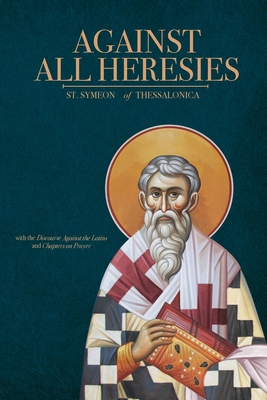
Of Thessalonica, St Symeon
Against All Heresies answers more than thirty questions posed by a priest to his bishop. Written in the decades before the fall of Constantinople in 1453, it begins by asking how we can bring unbelievers to the true faith, strengthen the faith of our brethren, and tend to those who have questions about the different belief systems and heresies that fill our world. The dialogue, which touches on numerous problems that remain relevant today, provides detailed answers by the holy archbishop, Saint Symeon of Thessalonica, who was himself a successor of Saint Gregory Palamas and a forerunner of Saint Mark of Ephesus. In addition to treating the problems of atheism, superstition, and astrology, the dialogue deals with the ancient heresies that plagued the Church through the period of the seven ecumenical councils, as well as the claims and objections of more recent opponents, most notably the Bogomils, Muslims, and contemporary Roman Catholics. Presented in simpler and intelligible language, Against All Heresies is a profound and edifying catechism deeply rooted in Scripture and in the hesychast tradition of the Church.
Also included in this volume is a shorter treatise, Against the Latins, which summarizes the polemic against Roman Catholicism in the Late Byzantine period as well as a series of chapters On Prayer, a Philokalic meditation on the Jesus Prayer and the blessed practice that St. Symeon calls "the work of the angels."







